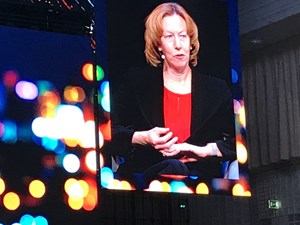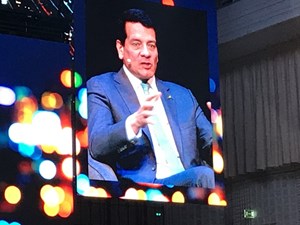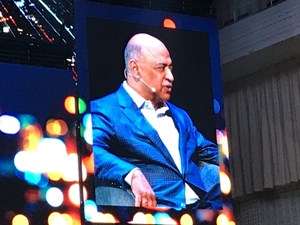SLB Digital Forum: Operators say their companies moving forward with digital connection of everything
(WO) — The process of industry companies digitally connecting most everything is moving inexorably forward said executive participants in a Tuesday mid-morning panel discussion at the Schlumberger Digital Forum in Luzern, Switzerland. Discussing the topic of “Everything Connected” were Woodside Energy CEO Meg O’Neill, Ecopetrol Group CEO Felipe Bayón, and IBM Chairman and CEO Arvind Krishna.
Overview of digital efforts. Asked about how Woodside is approaching greater digital transformation, O’Neill said that the recently completed merger (June 1, 2022) with BHP Petroleum is actually assisting the effort. “The merger with BHP doubles the size of our company,” explained O’Neil. So, it gives us a very significant change to our geographic footprint, a very significant presence in North America, and a stronger balance sheet. And what it really does for us in the context of connecting for a new future is it positions us very well to be able to invest in the technologies that we need to develop energy today, as well as some of the energy sources that will be increasingly needed in the future.”
Meanwhile, Colombian state firm Ecopetrol has had a bold 2040 strategy in place, with regard to digital transformation. Accordingly, the moderator asked Ecopetrol’s Bayón how his firm’s implementation of digital transformation affects its relationship with customers, suppliers and partners. “As we were laying out the strategy, the 2040 strategy, it was important for us in the midst of very trying and difficult times with COVID—with very difficult economic conditions for many people, not only in Colombia, but in the countries where we operate—to try to connect back,” said Bayón. “And we had been part of the conversation in terms of laying out foundations for recovery, ensuring that as we provide energy to people, that we could be part of that conversation with people. So, the strategy basically lays out that we want to continue to grow in the midst of the energy transition. We want to be very strong on key ESG. So, it’s putting technology at the heart of the conversation around how we actually see our connections with society, the environment and good governance. And lastly, through knowledge, we can change not only our staff, but how we connect with our communities.”
IBM’s Krishna was asked about his efforts to convince operators to leverage the power of digital technology and what factors are holding them back from fully embracing it. He said it’s rooted in the process of the industry trying to cut itself loose from its history and traditional operating methods. “Look, we’ve been in a transition out of traditional operations dating back to the 1920s,” said Krishna. “That is the the exact ‘transition’that the oil and gas industry has been talking about. I think artificial intelligence was first connected across processes. You can take all the data from all those processes in all industries, and the value of what AI unlocks is $16 billion in global productivity this decade. That’s not in the future— this decade. But in that amount is $1 billion associated with the oil and gas industry. So, the oil and gas industry would like $1 billion of extra, I'll call it profit. About half of that is attributable to sustainability and reduced emissions. I think that's the opportunity, and that's what we want to unlock with our partners.”
Implementation and the people angle. When asked whether the digital effort connects across silos in her company and how important that might be, Woodside’s O’Neill had an emphatic answer. “Oh, absolutely,” she exclaimed. “ And I'd actually like to build on Arvind's point around the value capture associated with digital. If you think about it, technology enables things like remote operations, autonomous operations, improved recovery. As stewards of natural resources, one of the biggest imperatives for us is to get as much oil and gas out of those reservoirs as we possibly can. Digital is absolutely essential to that, and it cuts across the company, as you asked, from the geosciences to the engineers to the production operator on the platform, to the engineers that support the facility design. It absolutely is essential. And, you know, hopefully we'll be able to get our share of that billion dollars that Arvind mentioned.”
Reference was made by the moderator to a keynote speech delivered earlier in the morning by Saudi Aramco President and CEO Amin Nasser. In that speech, he made reference to looking internally to one’s staff, to a firm’s people and the talent pool that is available. The inference being that industry companies may be focused away from looking at their partners and customers and shifting internally to looking at what they are doing with your own people digitally. The point being that digital skills are intrinsic to today’s work in the industry. And that seems to have generated not only short-term help for workers to adjust their skills, but there also is a long-term goal with respect to talent training and digital investment.
Accordingly, IBM’s Krishna was asked whether there is a disconnect between the real time needs right now and the digital needs of the future. “My short answer is actually no,” stated Krishna. “But, humans don't like change. It's just a fact of life. It's not a question of any one of you or any one of us. Our own people don't like change. So, I think you have to be aware of that as leaders and understand how you can help your people through the transition. Just berating them or hoping to hire new skills is not going to work; there aren't enough. That's just the first very, very quick observation.
“The half-life of skills is reduced,” he continued, “and everyone has to wake up to that. Fifty years ago, 30 years ago, people were able to stay in the same [portion of their] profession. Now it's about six different areas. That means the average person in their working career is going to have transition seven times. What are we, as leaders, doing to help improve those conditions in terms of training, health support, etc.? It’s a big part of what we have to do.”
Bayón was asked what a company should do, to plug the gap, when there is potentially a training void, yet workers are looking toward the digital future.
“As part of this strategy, we've set up, the third element is ensuring that we can retrain, retool, and reskill people,” answered Ecopetrol’s CEO. “So, at least 70% of our people will need to go through that, to Arvind's point, between now and 2030. And we've identified that we can create value for some $20 million to $30 million from that. I think more important is allowing people opportunity or the tools to ensure that they can have an even better balance in terms of their work life, ensuring that they can connect to what they're doing. And it's interesting that we're seeing that people used to flee from the industry are now coming back. And they say, “this is because we see that you guys are leading. We want to be part of that change.”
“I think technology is at the heart of that. So, only last year, we could account for $350 million of benefit from technology and digital. That empowers people. So, even though we're looking internally, it can connect us with people outside in the communities, when we think about not only emissions, but also things like water management. So there are other things that we can do that connect our employees to the people on the part of the communities.”
Climate, emissions and ESG. Another angle discussed was the relationship between the digital transformation and ESG issues. The moderator asked Woodside’s O’Neill how important it is to explain and communicate effectively a company’s climate policy to its employees, to propel them forward. “It's absolutely essential,” acknowledged O’Neill. “We want our employees to be ambassadors for the company, and they need to understand to be able to articulate how the work that we do [is solving ESG issues]. And that means providing reliable energy, providing affordable energy and providing energy that is lower carbon intensity. We produce about 70% gas, which is lower carbon intensity than many alternatives when used in power generation. That's a good thing. But we're also keen to be investing in some of the new technologies and the energy sources that have even less carbon intensity. And we think our investments in oil and gas today will help the world prosper and and help fund that transition into these lower carbon energy sources, which really are just nascent today. And it's going to take a bit of time to scale.”
Meanwhile, asked about examples of different fields of operations, where things work better, and the industry can present a united front, Krishna replied, “Let's just acknowledge that, first of all, we all live in what the sector produces. And the other sector also says, I think oil and gas is essential for safety, industrials, building materials and many other things, not just internal combustion engines. So, let's just begin with that. I do think an area that I was very involved in, and pleased to see make progress, is in cybersecurity. Let's acknowledge, cyber is going to be the problem of this century. And every one of my providers that I've spoken to in their office on these issues, they all worry about having to shut down operations. They (cyber hacks) cause damage, they cause a lot of stopping of operations. And I was pleased to see, I think, 18 companies come together in Davos to see if the oil and gas industry can come together and share best practices on cyber.”
Ecopetrol’s Bayón was asked how big a priority cybersecurity defense is for both him and his organization. “It is,” said Bayón. “And I once heard doubters, somebody saying there's two kinds of companies in the world, the ones that are being hacked and the ones that don't know they're being hacked. It means this is something that needs to be very, very, very relevant. The other thing is hackers don't break in. They log in. So back to the point of culture, how do we create a sense of this? And I'm with you, Arvind. It's our employees. But I also think technology can help us.
“I do believe it's one of the areas where we need to come together and work together. And it's a big threat. I mean, we don't manage the infrastructure that is critical for our countries, for our regions, and also for national security. So, we just need to ensure that it's (cybersecurity measures) always out there.”





